Career Starter Lab: NTUC’s pilot scheme to help fresh grads, NSmen transit into working world

The National Trades Union Congress (NTUC) unveiled last Friday (April 28) a new initiative to help fresh graduates from Institutes of Higher Learning (IHLs) and those who had recently completed their full-time National Service (NS) to transit into the working world.
Dubbed the Career Starter Lab, the pilot programme will take the form of an enhanced career trial model to help youths explore their career options and gain valuable work experience. It aims to officially launch with more than 100 companies onboard by the end of this year.
Partnering with the Singapore National Employers Federation (SNEF), the Career Starter Lab rides on the existing ecosystem of support offered by the Ministry of Defence (MINDEF), Ministry of Home Affairs (MHA), Young NTUC, NTUC’s e2i (Employment and Employability Institute) and other partners.
Championing the interests of workers
NTUC Secretary-General Ng Chee Meng said in a media statement that the enhanced career trial model was crafted based on feedback gathered by the NTUC Youth Taskforce, to meet the needs and desires of young people.
To date, the NTUC Youth Taskforce has engaged more than 10,000 youths, from Institutes of Technical Education (ITE), polytechnics, and autonomous universities to learn how they can be better supported in their career journeys.
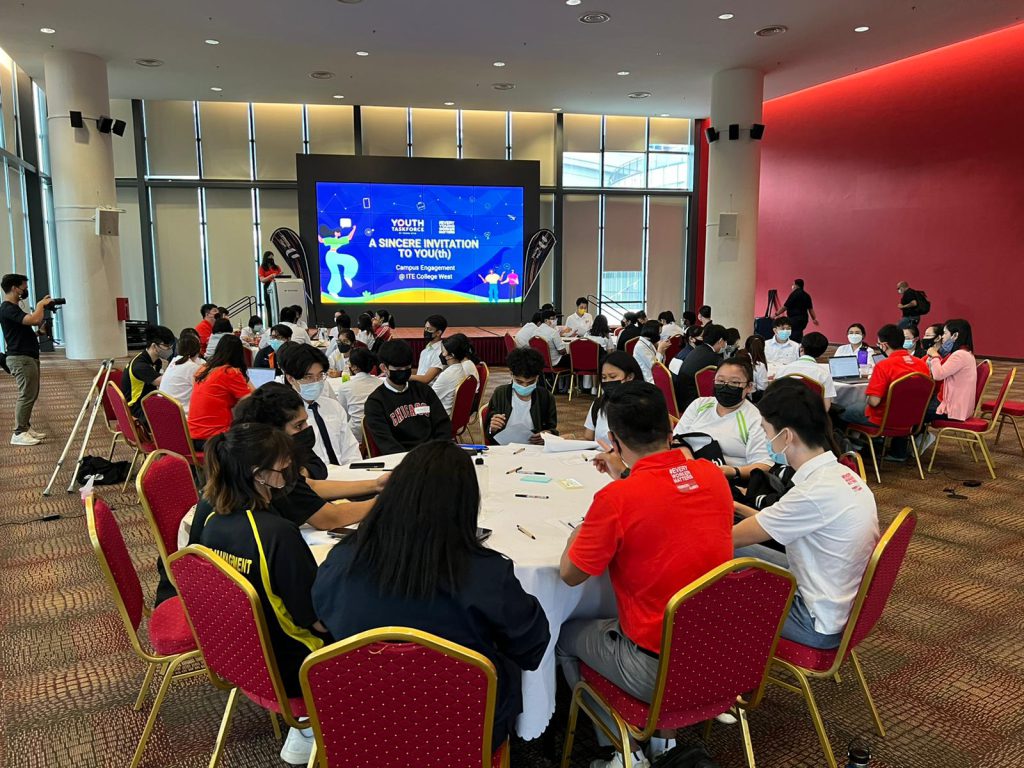
Out of the 10,000 youth engaged, nearly 4,000 were asked to list the resources they would need to shift from school to their dream careers. They cited quality internships (31.4 per cent), career mentorships (18.9 per cent), and part-time work (17.6 per cent) as the top three factors.
Furthermore, through a series of focus group discussions and dialogue sessions conducted last year, NTUC Youth Taskforce also found that proper supervision and mentorship were key components that make up a top-notch internship experience.
In line with these findings, the Career Starter Lab pilot will offer workplace mentorship as part of a dedicated support framework to help budding graduates and NSmen get the guidance and insights they crave.

Participants will have a chance to partner with a mentor who will provide them with the inside scoop on their chosen industry, as they navigate their career journeys.
At the same time, mentoring also allows existing employees to give back and make a difference in the lives of others. The “pay-it-forward” factor is believed to give them a greater sense of purpose and fulfillment.
Doing more and better for underserved segments

In his recent May Day Rally Speech, NTUC Secretary-General Ng shared that NTUC conceptualised the career trial after learning the key concerns of youths and difficulties experienced by employers in recruiting and retaining young talents due to the tight labour market and competition.
It got me thinking – can NTUC play a part to create a win-win for youths and employers, and complement IHLs’ internship programmes? Especially for youth finishing NS and transiting into work?
– NTUC Secretary-General Ng Chee Meng
The career trial is therefore aimed at bridging this gap, allowing youth to access quality jobs with the guidance of workplace mentors, and at the same time, for businesses to access a steady pipeline of young talents.
Through this initiative, NTUC and SNEF also aim to help youth better ease into their new jobs – acquaint them with the company culture, give clarity on their roles and expectations, and offer relevant learning opportunities under appropriate supervision and mentorship.
To ensure all participants have the best possible experience, NTUC and SNEF will be deploying staff to support companies that are taking part in the Career Starter Lab pilot.
They are also co-developing a career trial playbook and gathering 300 in-company mentors to build on the existing pool of over 400 volunteer career mentors, who will have access to related workshops and resources.
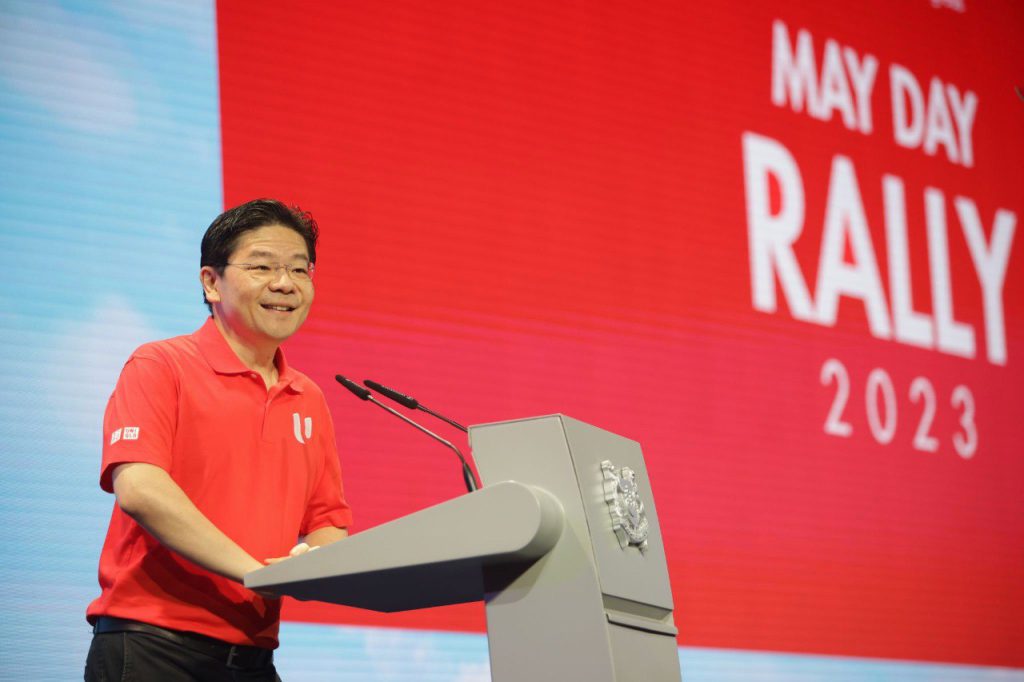
Additionally, in his May Day Rally speech, Deputy Prime Minister Lawrence Wong focused on the challenges posed by an ever-changing and increasingly troubled world, and stressed the importance of investing in every worker.
DPM Wong assured that together with his 4G team, they are studying ways to invest more in workers so they can take ownership of their careers, reskill and upskill themselves to seize better opportunities.
Particularly for polytechnic graduates, they are looking at helping them deepen their skills through different pathways so they can secure better salaries and career opportunities.
The government is also working closely with NTUC to support every worker in their journey of lifelong learning, protect their interests, and enable everyone to enjoy dignity at work and retire at ease.
The 4G team and I are fully committed to look after our workers, to protect your interests, and help you earn a better living and live a better life. … Come what may, we will always be there with you, for you. We will always have your back.
– Deputy Prime Minister Lawrence Wong
How much can participants earn through Career Starter Lab?
Through a three-month trial that comes with a structured training programme and workplace mentorship, fresh graduates and NSFs can test their job fit and get a feel for the organisational culture before committing to formal employment.
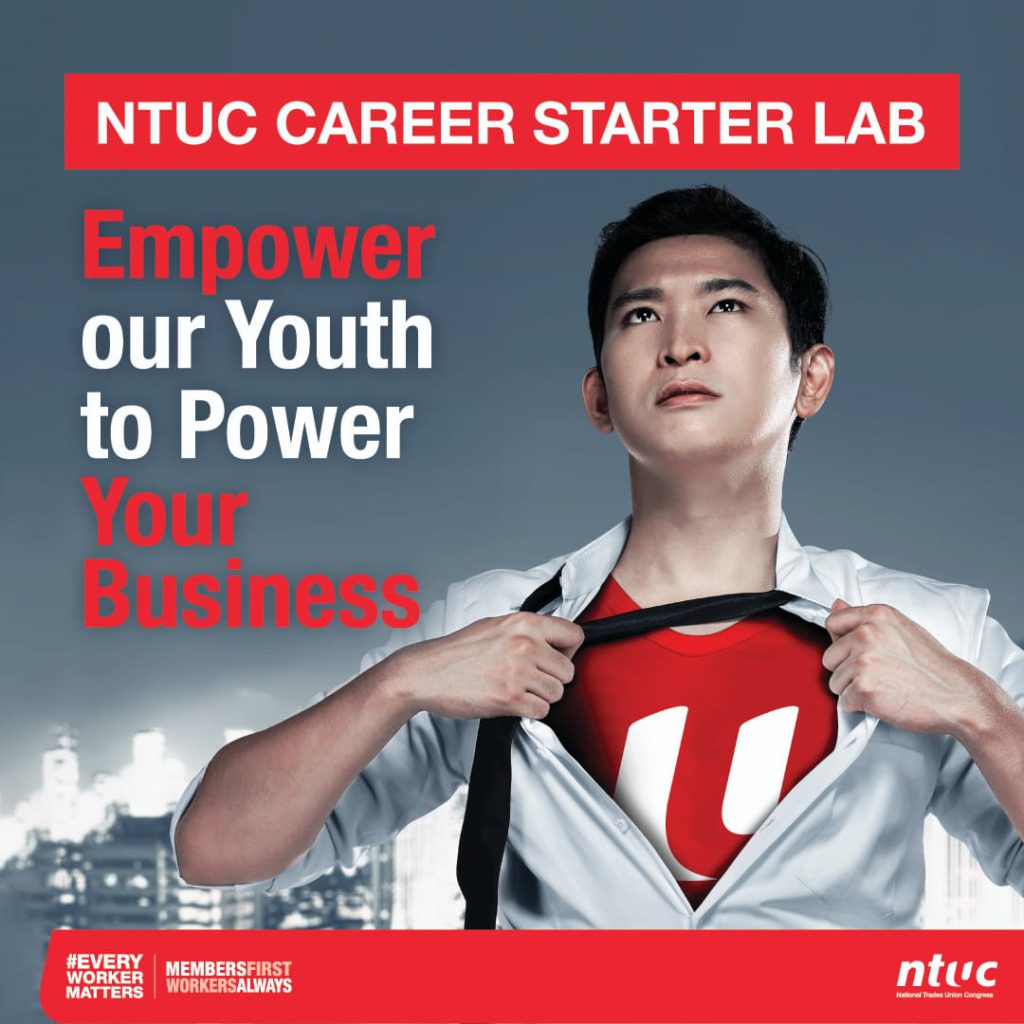
To help youths integrate better during the trial period, employers will be offered:
- Support administered by NTUC’s e2i,
- A guide developed by NTUC and SNEF to enhance their onboarding, structured training and mentorship programmes
Participating fresh graduates and NSmen will receive training allowance starting from S$7.50 per hour for up to 480 hours, as well as retention incentives if they are hired by the host companies and have worked for at least three months.
Current-year graduates and NSmen who have completed their service may apply to Career Starter Lab by the end of this year.
Training workshops for mentors are expected to begin in August, while interviewing and matching of jobs will kick off in September.
By December, at least 100 employers will have commenced the programme. Some of the notable enterprises that have already come onboard include Singapore Airlines, Rolls Royce, Resorts World Sentosa, Gardens by the Bay, Uniqlo, ST Engineering, Singtel and FairPrice Group.
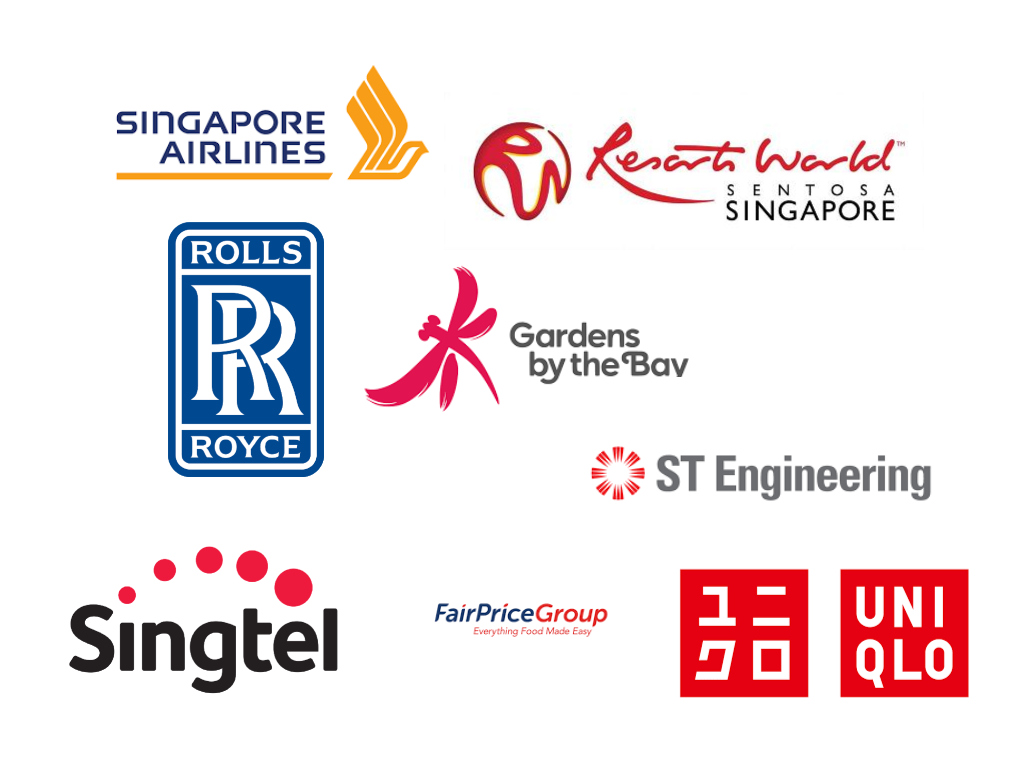
Employers with ready permanent roles or 12-month full-time contracts and are able to offer a monthly salary of S$1,800 to S$4,200 (based on prevailing average starting salaries of respective graduates) are encouraged to participate and register their interest here.
Youths are our future workforce. As every worker matters, NTUC wants to play a bigger role in meeting our youth’s needs and serving them better as they kick start their careers.
The NTUC Career Starter Lab will help our youth seize good opportunities so that they can progress into their careers with confidence. NTUC and SNEF will rally more progressive employers into our ecosystem to provide enhanced career trials for them. We want to assure our youth that we will be alongside them as they enter the workforce.
– NTUC Secretary-General Ng Chee Meng
In line with this goal, NTUC has embarked on a partnership with MINDEF and MHA to support full-time NSFs through career and education fairs which are organised by e2i and NTUC LeaningHub, as well as complimentary courses hosted on the SkillsFuture@NS Learning eXperience Platform (SG@NS LXP).
NTUC will continue to champion the interests of workers from all walks of life
More details about the Career Starter Lab initiative will be revealed in July when the NTUC Youth Taskforce has wrapped up its engagements.
Subsequently, all its findings and recommendations will be shared to address some of the pressing concerns and aspirations of youth in areas such as career, finances, and mental well-being.
NTUC believes that every Singaporean’s tomorrow matters and it will continue to champion the interests of workers and pave a way for the younger generation to fulfil their aspirations as a worker.
The NTUC Youth Taskforce is part of the #EveryWorkerMatters Conversations. Launched last August, it is a large-scale, year-long series of engagements seeking to connect with 40,000 workers of all ages and from all walks of life, with a particular focus on Singapore’s workforce.
These engagements set out to uncover their work-life needs and aspirations, which in turn, help NTUC better understand and represent workers’ interests. In particular, they have lobbied for improved wages, benefits, and protection for platform and low-wage workers, as well as encouraged mature PMEs to upskill and increase their employability.
This laudable effort is one of the many ways in which NTUC endeavours to renew its time-honoured pledge to the workers, made more than six decades ago.
This article was written in collaboration with the National Trades Union Congress (NTUC).
Featured Image Credit: Singapore Institute of Technology / Ministry of Defence
Also Read: A look at NTUC’s Career Progression Model and what it means for skilled essential tradespeople
A look at NTUC’s Career Progression Model and what it means for skilled essential tradespeople

The National Trades Union Congress (NTUC) recently proposed a new framework called the Career Progression Model (CPM) for skilled essential tradespeople, such as plumbers, aircon and mechanical ventilation mechanics, as well as electricians.
According to the Singapore Labour Force Survey 2022, the number of such tradespeople is on the decline in Singapore, and more than half of them are over 50 years old. The number of resident employees in these trades have also fallen by 40 to 50 per cent over the last decade.
This trend is concerning – if it continues unabated, Singapore will “see a critical lack of local expertise in these sectors in 10 years’ time,” said NTUC Secretary-General Ng Chee Meng.
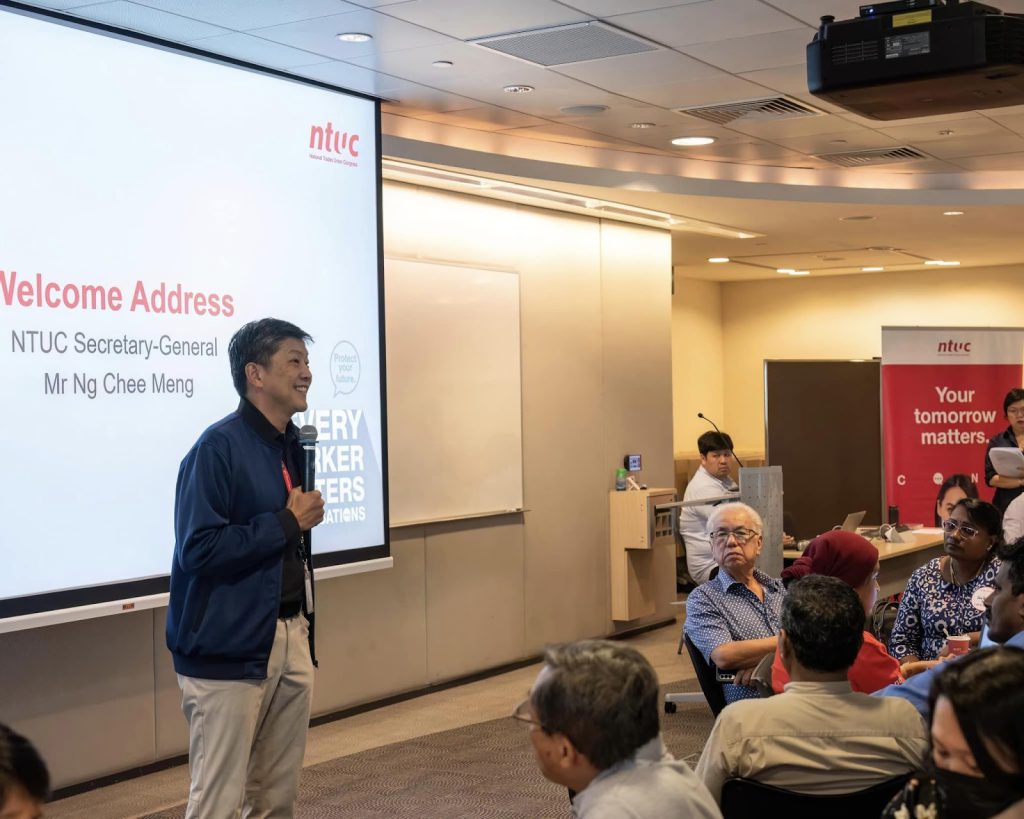
Why are skilled essential tradespeople disappearing, and what does it mean for Singaporeans?
The purpose of the CPM is to resolve the issue of having insufficient tradespeople in Singapore, but in the first place, why is this industry facing a manpower crisis?
Perhaps, there are answers to be found by looking at how Singaporeans view our tradespeople.
When we consider what we can make a career out of, what jobs come to mind? Lawyers, doctors, accountants, engineers, and other white-collar jobs are probably at the top of that list.
These careers often command high salaries, and are typically attributed to the significant amount of training and education that these professionals have to go through.
Tradespeople have to undergo training too, and it may take years to perfect their craft as well. However, these jobs are sometimes associated with social stigma – as being blue-collar, dirty, or comprising manual labour instead of intellectual work.
Additionally, tradespeople are not often seen as high earners, with the median monthly wage of skilled trade workers at around S$2,600 in 2022, around the threshold for lower-wage workers as well.
But why? One reason could be a lack of career progression.
Lawyers may talk about climbing the ranks to make partner, or doctors may decide to become specialists, opening their own clinics, or become a resident physician after their mandatory stint as a house officer or resident.
While it is true that one can train to be a skilled craftsman at any stage of their life, it is also true that after entering the craft, there is not really a tangible path that they can take in order to advance their careers.
Tradespeople often have no such structure in place for them. Becoming a plumber, technician or electrician, may very well be the final career stage for individuals who choose to ply these trades.
All these meant that only a small number of our youths are interested in learning these professions. For a country as obsessed with financial security and success as Singapore, this should come as no surprise.
The implications of having a critical shortage of skilled tradespeople in Singapore would affect all of us – modern cities like Singapore rely on a steady supply of clean water, waste disposal, and electricity to function properly, 24 hours a day, seven days a week.
To ensure that these essential trades do not face labour shortages in the years ahead, we must do better to uplift tradespeople and attract younger workers to consider skilled trades as a profession.
What does the CPM actually do?
The CPM’s goal is to attract more youths to join the skilled trades professions – and given that Singaporeans are a practical bunch, the solution must also deal with practical concerns such as the cost of living.
“They should be rewarded with a compensation package that is commensurate with the important essential work that they do,” said Mr Ng.
With a median salary of S$2,600, it is safe to say that the financial compensation of a job in this sector is not exactly a pull factor drawing youths into these professions.
The Ministry of Education’s latest poll revealed that the gross median monthly salary for fresh graduates in Singapore has risen to S$4,200, around 60 per cent higher.
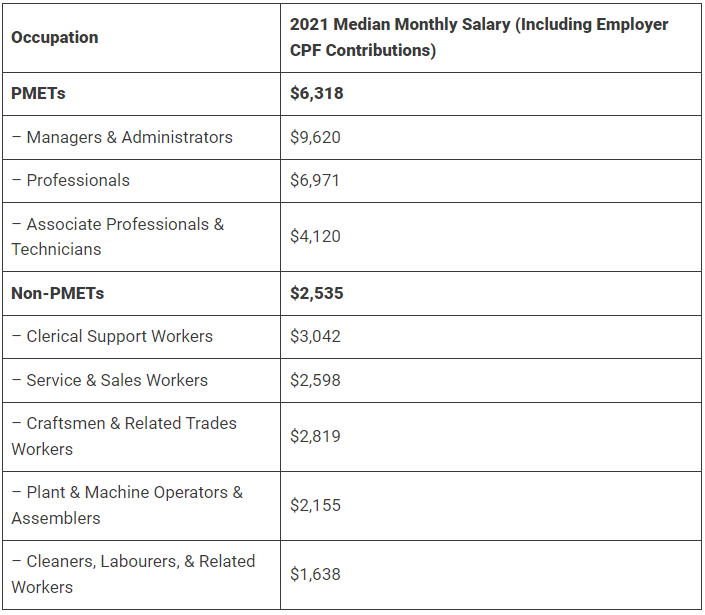
In order to attract youths into the skilled trades industry, the salaries of workers in the industry needs to be raised as well.
As such, NTUC will be working with stakeholders to develop and implement the CPM, which will provide structured skills training that will lead to better career prospects and salaries.
There will also be more training pathways from tertiary education into skilled essential trades, and clear, transparent quality standards for these sectors will also be publicised. NTUC plans to incentivise companies in implementing productivity and technological improvements as well.
The current iteration of the CPM will target trades that directly affect Singaporeans’ lives: our plumbers, electricians, and air-conditioning and mechanical ventilation mechanics.
Just as the PWM is intended to help uplift lower wage workers by providing them with higher salaries and opportunities for career progression, the CPM is intended to help workers in the skilled trades industry in the same way.
What else can we do to help skilled essential tradespeople?
There’s an old joke that resurfaces every few years, of a ship captain that could not figure out why the ship’s engine would not start.
In desperation, he called in an old mechanic to help solve the problem, and after a thorough examination, the mechanic produced a small hammer from his toolbox and simply tapped the engine on its side, reviving it instantly.
The captain later received a $10,000 invoice from the mechanic, who was outraged and asked for a breakdown of the cost. The mechanic replied that while the task may have only cost $2, knowing where to tap was far more valuable than the tap itself.
This story showcases that we often take tradespeople for granted, thinking that the work they do is easy, and requires little, if any, brainpower.
What we see may be just the little tap of the hammer, but what we do not see is the wealth of experience and knowledge that takes years of hard work to accumulate.
It is this experience and knowledge that allows tradespeople to make their work seem effortless, and it falls to us as Singaporeans to get rid of the stigma that these workers receive, simply because their jobs are not as glamorous as the ones we put on a pedestal.
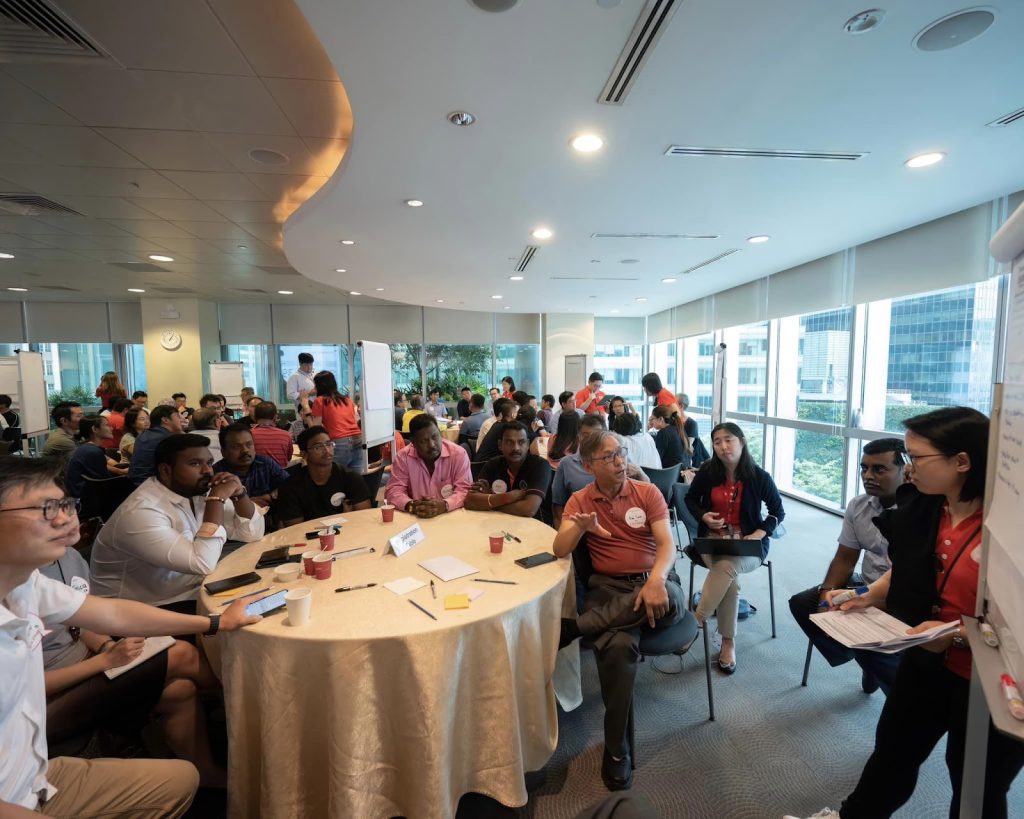
Perhaps, it is time that we Singaporeans show more support to these tradespeople, and do more for them as a society as well. Their trade and skills are essential to Singapore, and NTUC recognises this and is making important strides to help them.
Their concerns were also shared during an event that was part of the #EveryWorkerMattersConversations, where workers are free to discuss issues that pertain to their livelihood.
The skilled trades industry is experiencing a scarcity of young workers and in order to avoid labour shortages in the future, it is crucial that we address this issue now and NTUC’s CPM is just a step forward in resolving it and help shape a collective future as Singaporeans.
This article was written in collaboration with NTUC.
Featured Image Credit: Singapore’s Finest, PowerMax, The Wedding Vow
Also Read: 1 in 3 people in SEA are actively looking for a job, according to new study by SEEK and BCG
Mature PMEs face challenges at the workplace, but what’s being done to tackle this?
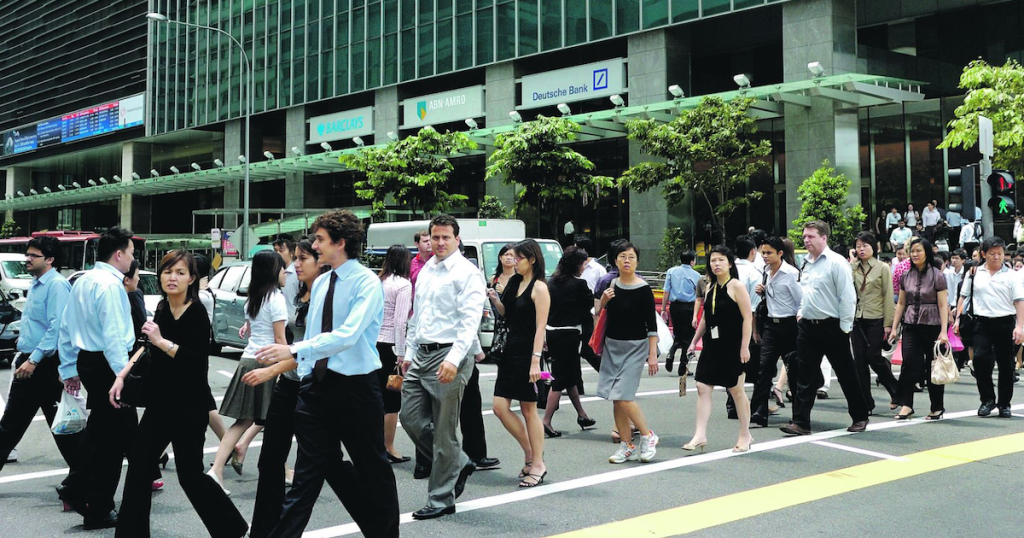
The COVID-19 pandemic has certainly changed the business landscape in Singapore. Caught off guard, many businesses were forced into a sink-or-swim situation, and with revenues drying up, many had to resort to cost-saving measures to ensure their survival.
One of these measures, as expected, was to impose hiring freezes and retrench workers. Several months ago, the crypto space saw a number of companies lay off workers. The tech sector was also rocked by layoffs with 17,000 tech workers laid off in May alone.
According to the Ministry of Manpower (MOM), the total number of retrenchments in Singapore rose to 1,600 in the third quarter, from a previous all-time low of 830 during the previous quarter. Of these, the majority were in the services sector. This rise, according to MOM, was a result of companies’ reorganisation or restructuring.
While retrenchment may be a risk for many, the consequences are not always equal. Being retrenched in your 40s or 50s, with children to support and elderly parents to take care of, means that retrenchment can be far more devastating for mature PMEs than for those without dependents. Yet, these PMEs also report that they are far less optimistic about their prospects for the future.
So why are they — with their wealth of experience — not confident about getting a job, and what is being done to help them?
Understanding the struggle
According to a survey by NTUC and the Singapore National Employers Federation (SNEF), PMEs felt that their age was a significant disadvantage. While they were confident in their skills, they were less confident about getting hired.
While 58 per cent of mature PMEs surveyed were confident in getting a job with their skills and capabilities, a significant portion of PMEs also cited age-related concerns as to the reason why they were not getting hired.
63 per cent of these PMEs felt that employers perceived them as easily replaceable due to their age, and 71 per cent of mature PMEs felt that companies were not open to older workers.
As such, some PMEs even accept significant pay cuts to remain employed. Others also report that they face age discrimination in the workplace, and feel worried about competition from foreign PMEs.

On top of this, we should also understand that as Singapore develops, the skill sets that were once uncommon and in demand may no longer be so, and since mature PMEs may have gained their skills before such shifts, time itself could be making their skills irrelevant and hurt their employment prospects.
Younger PMEs, on the other hand, are less concerned about their future. According to the survey, younger PMEs were more confident about career opportunities, more confident about their current skills, and significantly less worried about age being an impediment to their employment.
In fact, only 27 per cent of respondents aged between 20 and 40 years old felt that they were easily replaceable due to their age.
This is somewhat expected – younger PMEs with newly-learned skills have less to fear about their skills becoming diffused, and their age is less of a factor because there are less likely to be concerns about them having to juggle work commitments with family time.
What help can PMEs expect?
The NTUC-SNEF PME Taskforce (PME TF) was set up to better understand the concerns and needs of PMEs in the workplace.
Since the PME TF was set up in 2020, it has been actively engaging PMEs and business leaders in order to better understand the challenges that PMEs face. In 2021, it released its report along with nine recommendations to help PMEs compete fairly and more effectively in the labour market.
One of the courses of action that the taskforce recommended was to improve Human Resources standards and enforcing these standards in companies where discrimination takes place.
To that end, the Tripartite Committee on Workplace Fairness is expected to release its report by the end of the year, and work with the Institute of Human Resource Professionals to certify HR professionals and improve HR standards and practices in companies.
However, NTUC assistant Secretary-General Patrick Tay, who co-chairs the PME TF, has noted that such employers are in the minority.
Fortunately, the general sense (is) that there are only small numbers of errant employers. So I think one of the key things we hope to see is to address some of these more egregious cases specifically.
– NTUC Assistant Secretary-General Patrick Tay
Singaporeans, including mature PMEs, are also encouraged to attend courses for upskilling and certification to increase their employability. SkillsFuture credits are made available to Singaporeans to attend these courses, and MOM has been working to promote employer recognition for these skills.
That said, the implementation of these measures do not simply mean that the courses will be taken up. There is a concept of opportunity cost, where taking a certain action would mean giving up the chance to take a different option.
For PMEs who are actively working, this could mean having to resign from their current job before they can enrol in such upskilling courses, and having to find a new job once they complete their upskilling courses.
Certainly, this is not an ideal situation. Mature PMEs, as we have seen, face difficulties in securing a job because of their age, and since they may also have children to support and parents to take care of, the lost income may pose a financial problem.
As part of the nine recommendations by the taskforce, NTUC has recommended that stronger unemployment support be provided for PMEs who are moving into new jobs, with additional support for union members and mature PMEs.
At an engagement session on 2 November 2022 at the Star Vista, Manpower Minister Tan See Leng affirmed that the government has heard NTUC’s calls for unemployment support for workers and is currently looking at how it can better support displaced workers.
The event saw over 60 PMEs engaging in focus group discussions and a dialogue session with Dr Tan and NTUC Secretary-General Ng Chee Meng.
Tay previously pointed out that 80 per cent of unemployed workers take six months to find a new job, and has consequently recommended that the government provide short-term salary support of up to 50 per cent – capped at S$3,800 a month for six months – for firms that hire mature PMEs.
Additionally, NTUC has also supported PMEs via Company Training Committees, to help them with their career progression and career planning.
Evidently, Singapore’s PMEs can count on NTUC and the government for some support. As Tay joked during an NTUC’s #EveryWorkerMatters Conversations event at LinkedIn, “I’m not a Liverpool fan, but you’ll never walk alone.”
What can PMEs do in the meantime?
Currently, MOM is still reviewing the recommendations that NTUC has provided through the PME TF, including its proposals to provide unemployment support for retrenched PMEs.
Since PMEs have shared that they would very much appreciate interim assistance in the event of retrenchment, Ng has also expressed that he hopes MOM would strongly support the proposals.
NTUC Singapore is still lobbying for unemployment support for our PMEs, which will provide interim aid and much-needed assistance to vulnerable PMEs. I know that MOM is reviewing this recommendation and I’m keeping my fingers crossed because this move will go a long way to support our PMEs’ welfare.
– NTUC Secretary-General Ng Chee Meng
While both Ng and Tay have promised to continue championing the interests of local PMEs and pushing for more support for mature PMEs, they also stressed that NTUC also understands that there is always room for improvement.
As such, Ng encourages workers to speak up about their needs, as well as their aspirations for the future.
Through #EveryWorkerMatters conversations, we will engage you to better understand your work-life needs. NTUC wants to champion your interests.How can we enable you to upgrade skills and compete in this new environment? How can we protect the vulnerable workers amongst us? How can NTUC give you greater assurance as your needs in life evolve?
– NTUC Secretary-General Ng Chee Meng
No organisation can fulfil its purpose without information. Although NTUC has been actively engaging many PMEs to understand their needs, it is asking for even more PMEs to voice any concerns that they might have, so that it can better fill any gaps that have thus far been left unaddressed.
With the recommendations that NTUC has put forth so far, it seems clear that NTUC believes strongly in its cause for championing the interests of the local workforce, and it wants you to help them help you.
If you have any issues or concerns regarding retrenchment or employment, NTUC is willing to listen and help. You can kick start a conversation that will help to shape a better future for you here.
This article was written in collaboration with the National Trade Union Congress.
Featured Image Credit: Piloto Asia
Also Read: Nation of unhappy workers: Why S’poreans are more overworked than everyone else in APAC
NTUC wants to hear from the working people of S’pore, urges the public to share their concerns
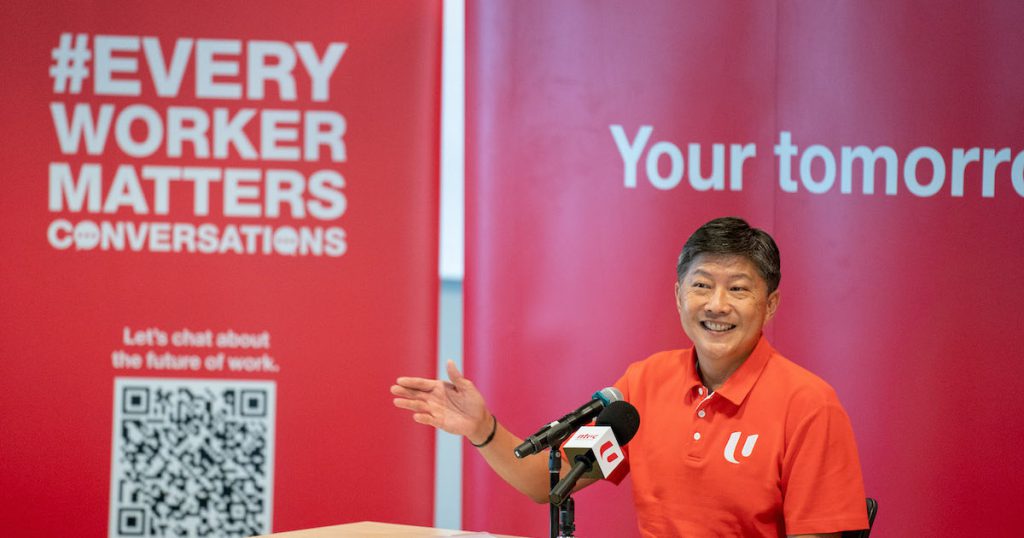
NTUC Secretary-General Ng Chee Meng addressed the media on August 11 in a closed-door interactive session with union leaders to share the launch of #EveryWorkerMatters Conversations, a year-long series of engagements where NTUC will engage workers from different walks of life to understand their needs and concerns.
This will help NTUC better identify how it can co-create the future of work and strengthen the workers compact, in line with the labour union’s long-term plan to tackle the uncertainties facing Singapore and the workforce.
We’ve done many things over the last two years, but we will not rest on our laurels. We’ll take a deeper dive to see how we can champion the interests of our working people. This means all collars — white collar, blue collar — [and regardless if] you’re an employee, freelancer, younger or older, men or women.
– NTUC Secretary-General Ng Chee Meng
Ng acknowledges that Singapore will continue to be tested, especially with the advances in technology and the economic world that will continue to evolve post-Covid.
At the same time, he also recognises the potential of job polarisation, which could potentially widen income inequalities if active measures are not taken to champion the interests of the working people.
How will #EveryWorkerMatters conversations help the workforce?

According to Ng, NTUC’s objective is to further identify with the anxieties and needs of the workforce.
A recent survey it conducted with approximately 1,000 workers saw a rise in concerns: lack of career progression, lack of bargaining power to negotiate for better employment terms, and an overall lack of work-life balance in Singapore.
Singaporean workers want Singapore to remain meritocratic, open, and have responsive measures toward new challenges. #EveryWorkerMatters Conversations seek to engage with them, understand their challenges, and hopefully in time to come, work with employers and the government to put in proposals and concrete measures to forge a new workers compact.
– NTUC Secretary-General Ng Chee Meng
In turn, this exercise also aims to engage with employers, government policymakers and partner organisations, as it listens to the views and aspirations for the social compact around work, including the trade-offs and sacrifices each must make.
Through the conversations, engagements, and workshops, NTUC hopes its autonomous, independent efforts allows them to have a voice to plug into the larger-planned social compact, hence further enabling them to represent workers’ interests in a clearer and more accurate manner.
A three-phase exercise to “enable, assure, and protect” workers

The first phase of #EveryWorkerMatters takes a divergent approach, and will run from now until end-2022. During this period, NTUC will engage the public to hear their views on the compact with workers.
“We’ll hear from many workers in our own networks, going all the way down to the voting grassroots. This will give us a first-hand understanding of some of the issues faced that may not be said so openly,” said Ng.
He adds that different workers have different concerns. For instance, there are women in the workforce who need flexible working arrangements as caregivers. There are also other segments of workers — those with aged parents and young children, senior workers, young workers, as well as the PMEs — that face other host of issues that NTUC might have yet to hear of.
In its second phase starting in 2023, the exercise will move towards a convergent approach. NTUC aims to organise a series of policy workshops with tripartite partners, Institutes of Higher Learning (IHLs), civic society organisations, Human Resource practitioners, and other partner organisations.
This is to crystallise recommendations and concrete suggestions on how the worker’s compact can be strengthened. Ng recognises that this stage brings about a difficult conversation with employer partners worrying about productivity, and on the other hand, workers’ having legitimate concerns about being burnt out from the different duties they have.
We have to bring in the employers and government to see what we can do collectively to answer the issues in the compact workers contract, and ultimately, deliver first-hand feedback to the government on what these important constituents want to see in the future of Singapore.
– NTUC Secretary-General Ng Chee Meng
Finally, NTUC’s third phase for the exercise will encompass looking at surfacing findings from earlier phases and releasing its recommendations by mid-2023. This entails working with 4G leaders and government policymakers through Forward Singapore.
Changing times need us to change how we work for workers
Although upscaling and rescaling in terms of concrete intellectual ideas has been in NTUC’s repertoire for a long time, Ng clarifies that it’s important not only to update policies, but update the way they are implemented.
The union paradigm was formed in the 1800s. In a new world where labour is more mobile, if you really want to answer to the needs of these segments of the workforce, can we still use a paradigm that is a hundred years old and apply it to a platform space today?
– NTUC Secretary-General Ng Chee Meng
Ng also emphasised how NTUC is not looking at a singular method of reaching out to the workforce.
“As long as the method is applicable, we are willing to go with it. If we can engage the youth via TikTok, we will try. Whether it is focus groups, a Saturday morning team building with young SME bosses together with union leaders, or bringing in older workers for an informal chat.”
Over the past two years, it kickstarted the initiative by engaging workers across different sectors. Moving forward in phase one, it is looking to zoom in on other exploration challenges it may face.
By changing the paradigm of what it means to represent workers, Ng hopes that NTUC can bring an overarching effort and move forward as the champion voice of the working people in Singapore.
On August 12, Ng also released a personal letter addressed to all workers in Singapore, capturing his vision of a future that NTUC wants to champion for workers, with workers playing a part too.
He talked about the need for a fairer and more inclusive workforce, with allowance for greater flexibility to balance life’s responsibilities. He also assures that NTUC is working towards a new workers compact – directed by the people – to ensure that the workforce’s needs are addressed accurately.
On that note, he strongly encourages workers of all ages to engage in the #EveryWorkerMatters Conversations to help NTUC better understand how it can best protect and upskill the workforce.
NTUC is committed to starting a conversation that kick starts a better future for you, in order to promote a future in which every one has a job they can be proud of, and ultimately a future of better jobs and better lives. Reach out to NTUC to share your workplace concerns and feedback here.
This article was written in collaboration with NTUC.
Featured Image Credit: NTUC
Also Read: Forward Singapore: DPM Wong lays out future roadmap, stresses need to refresh “social compact”

